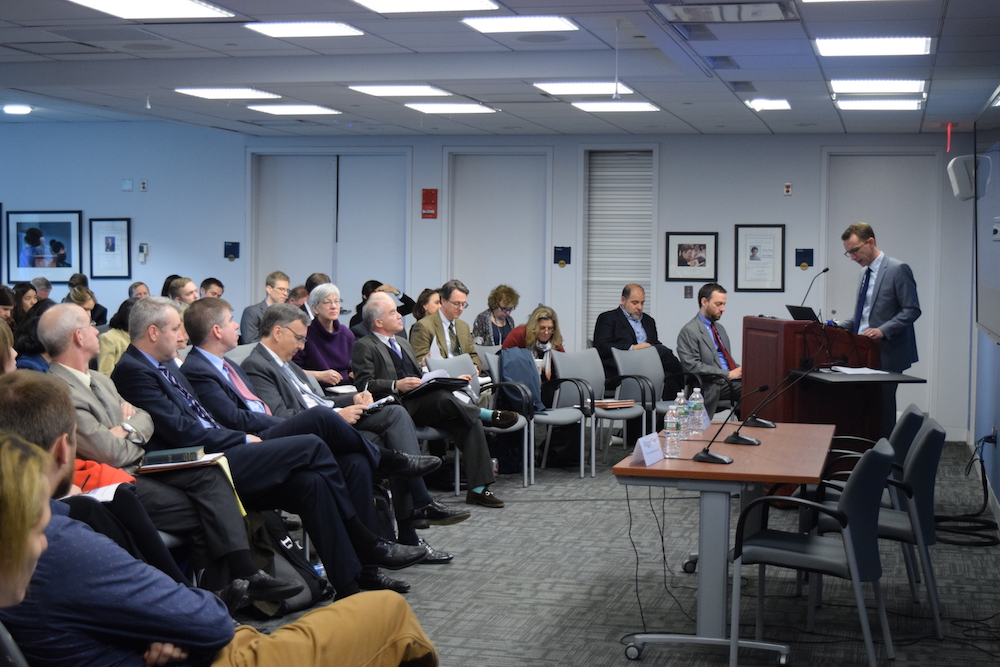February 2017
by Remi Jedwab (George Washington University) & Adam Storeygard (Tufts University)
Institute for International Economic Policy (IIEP)
At the Elliott School of International Affairs
February 2017
by Remi Jedwab (George Washington University) & Adam Storeygard (Tufts University)
This project argues that presidents organize decision-making to respond to economic crises not driven by personality or institutional constraints, but rather by cognitive contexts. The higher the frequency of crises, the more inclined the president to use hierarchical, rather than collegial, decision-making processes. The argument is tested comparing cases in the US and Argentina.
Alejandro Bonvecchi holds a BA in Sociology from the University of Buenos Aires and a Ph.D. in Government from the University of Essex. He is an Assistant Professor at the Torcuato Di Tella University in Buenos Aires and an Adjunct Research of the National Council for Scientific and Technical Research in Argentina, where he works on presidential and legislative politics and the political economy of economic policymaking. He has published four books, and his work has appeared in Presidential Studies Quarterly, Legislative Studies Quarterly, Publius, Latin American Politics and Society, and Journal of Politics in Latin America.
Stephen B. Kaplan is an Assistant Professor of Political Science and International Affairs. Professor Kaplan’s research and teaching interests focus on the frontiers of international and comparative political economy, where he specializes in the political economy of global finance and development, the rise of China in the Western Hemisphere, and Latin American politics. Professor Kaplan joined the GWU faculty in the fall of 2010 after completing a postdoctoral research fellowship at the Niehaus Center for Globalization and Governance at Princeton University and his Ph.D at Yale University. While at Yale, Kaplan also worked as a researcher for former Mexican President Ernesto Zedillo at the Yale Center for the Study of Globalization. Prior to his doctoral studies, Professor Kaplan was a senior economic analyst at the Federal Reserve Bank of New York, writing extensively on developing country economics, global financial market developments, and emerging market crises from 1998 to 2003. He received his B.A in International Relations and Economics from Tufts University, and an M.S in International Economic Development from Georgetown University.
Jay Shambaugh is a professor of economics and international affairs at the George Washington University. He is the director of the Institute for International Economic Policy. Professor Shambaugh’s area of research is macroeconomics and international economics. His work includes analysis of the interaction of exchange rate regimes with monetary policy, capital flows, and trade flows as well as studies of international reserves holdings, country balance sheet exchange rate exposure, the cross-country impact of fiscal policy, and the current crisis in the euro area. In addition to his book, Exchange Rate Regimes in the Modern Era (MIT Press, 2009), Shambaugh has published in The American Economic Review, The Quarterly Journal of Economics, and other leading journals. Prior to joining the faculty at George Washington, Shambaugh taught at Georgetown and Dartmouth and served as first Senior Economist for International Economics and then Chief Economist at the White House Council of Economic Advisers. He is also a Faculty Research Fellow at the NBER and a visiting scholar at the IMF. Shambaugh received his Ph.D. in economics from the University of California at Berkeley, an M.A. from the Fletcher School at Tufts, and a B.A. from Yale University.

President Trump has promised a markedly new direction in U.S. trade policy through tweets, appointments, and executive orders. Regardless of these first steps and initial press reports, substantial questions remain about whether some of the actions in fact can be adopted within existing legislative and constitutional constraints. In other areas, President Trump’s authority to pursue radically different policies likely are well-established. George Washington’s Institute for International Economic Policy hosted a full day conference to examine what President Trump can, and cannot, do on trade policy without new congressional authorization. Participants will hear from panels that will include a team of two leading lawyers and economists with substantial first-hand trade policy experience. This conference provided audience members with important perspectives on the limits of President Trump’s emerging trade policy.
The President has substantial leeway for initiating various trade remedy actions (antidumping, countervailing duty, and safeguards). U.S. trade law practice and procedure may limit the scope of imposing duties under these provisions.
The U.S. Treasury may determine that a country manipulates its currency but only under certain statutory conditions. Would China qualify under those provisions? What consequences might it face if China is declared a “currency manipulator”?
U.S. trade agreements such as NAFTA allow for either Party to announce a withdrawal with six months’ notice. Can President Trump do so without congressional approval? What would be the impact on U.S. trade and investment flows if he were to follow through with such threats?
President Trump has suggested imposing 35 percent tariffs on individual U.S. firms that offshore manufacturing jobs. Can the Administration single out individual companies in this way? How might such threats increase uncertainty on inward and outward U.S. foreign investment?
An aggressive new U.S. trade policy may result in formal disputes with WTO members. What are the most likely cases that might arise? How might the U.S. economy be affected if the WTO rules in favor of those who contest new U.S. approaches in trade policy?